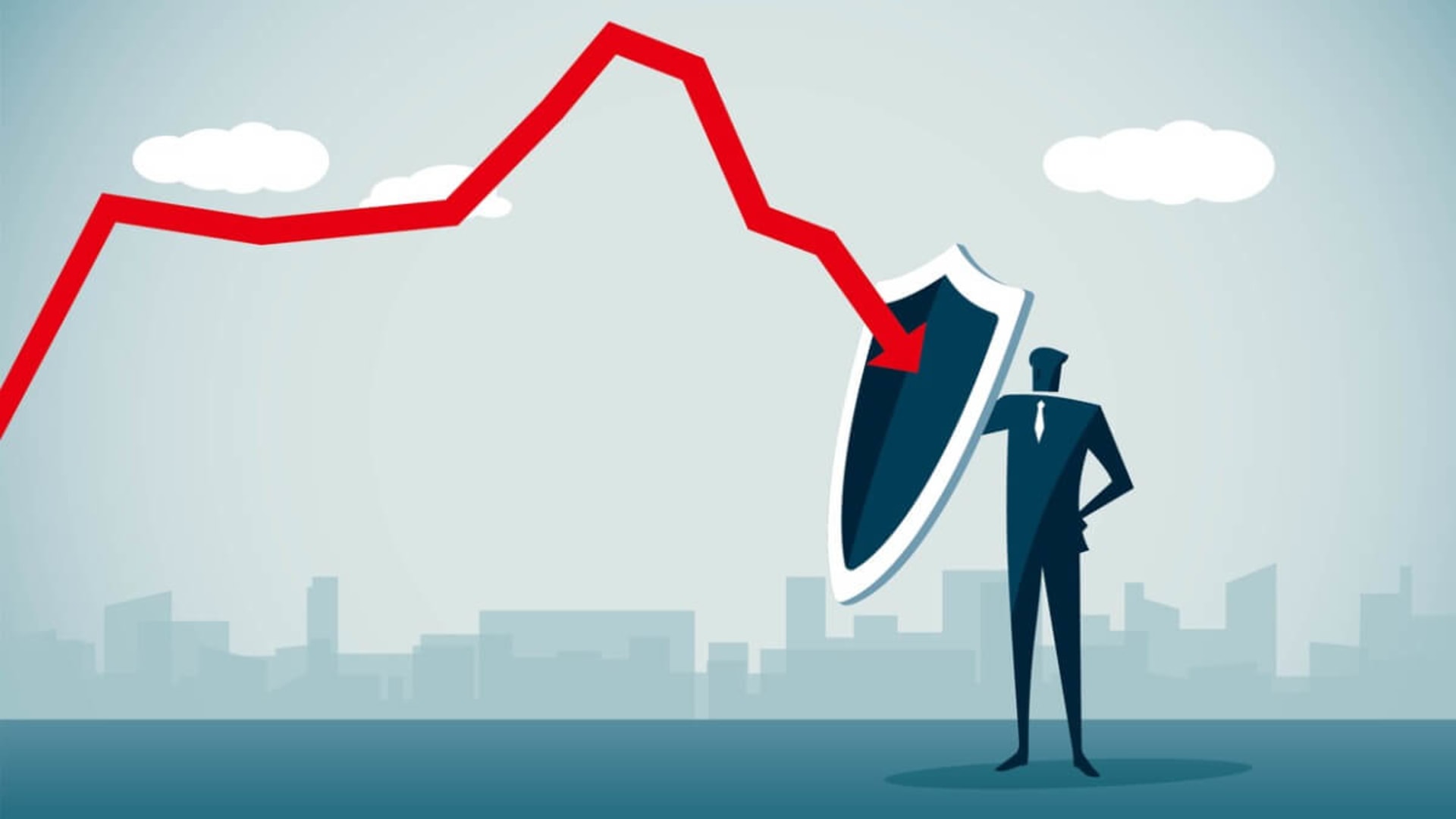A recession is a period of economic downturn that is part of the natural ups and downs of the economic cycle. Technically it is defined as two consecutive quarters of negative economic growth when adjusted for real gross domestic product (GDP). Many economists point out that it is sometimes difficult to identify a recession until the economy is well into it or even past it.
A recession may last from several months to several years and include elements such as job losses, a slowed rate of manufacturing, a reduction in consumer spending, and a reduction in real income. Businesses are commonly impacted negatively, resulting in reduced revenues because customers have less to spend. Unfortunately, the effects can last much longer than the recession itself.
With so much talk of a possible recession in the news lately (the following video is just one example), it might be tempting to feel helpless. A recession seems like one of those forces, similar to natural disasters that business owners simply have no control over. But while it’s true you can’t prevent a recession from happening, you can take steps to reduce the negative impacts when it does. Especially if you’re a small business, according to Inc., “you need to prepare as if a downturn is a certainty.”
In the sections below, we explain why you should make efforts to recession-proof your business and offer several strategies to do it. We also cover the potential advantages of a recession, and yes, there are some.
Why Recession-Proof Your Business?
A recession can have one or more of the following impacts on your business.
-
- Reduced revenue. During a recession, customers typically have less to spend, meaning they will be much more careful about what they do spend on. If what your company provides isn’t critical, your customers may discontinue purchasing from you, at least temporarily.
Quick fix: As a result of reduced revenue, you might need to cut your spending as well. Examine your budget to see what is unnecessary or redundant. Consider looking for long-term cost-cutting measures such as remote work arrangements that require less use of expensive office space, utilities, equipment, furniture, and other resources.
- Reduced revenue. During a recession, customers typically have less to spend, meaning they will be much more careful about what they do spend on. If what your company provides isn’t critical, your customers may discontinue purchasing from you, at least temporarily.
- Difficulty accessing credit. During a recession, it is common for lenders to be stricter about requirements for borrowing and to raise interest rates.
Quick fix: If possible, avoid taking on debt during a recession because the interest rate is likely to be high, which will become a problem when it’s time to pay off the loan. However, if you must, shop for the best interest rate and remember that you can renegotiate or get a lower interest rate loan to pay this off later.
- Cash flow crunch. Several factors may contribute to cash flow issues during a recession. If customers put off paying you, you may need to delay payments to some of your vendors and suppliers. The situation can become even more complicated if a company that is a customer of yours goes out of business, leaving their bills unpaid.
Quick fix: Give customers a discount for paying you immediately or within a brief period. Also, allow them to pay you upfront for a larger-than-usual amount of your products or services.
- Product quality drops. As companies look for ways to cut costs due to declining revenue, they may end up cutting quality too. Unfortunately, this measure can result in a vicious circle. As you cut quality, customers may take their business elsewhere, forcing your revenue down even more.
Quick fix: Make quality front and center in your considerations for managing your budget during a recession. Remember that recessions typically last less than a year. See if you can find temporary ways to cut costs that don’t interfere with the quality of your products or services.
The definition of recession is iffy, and many experts won’t even say we’re in one until well into it or even after it has passed. The quick fixes above can help if a recession is already underway. But, it’s better to prepare in advance — even if a recession never comes — because the things you do to recession-proof are good strategies to keep your company stable under various circumstances. Here are six of the most important.
Strategy 1: Finances
Create an alert reminding you to look at your budget every quarter or so. You should seek out any expenses that are unnecessary or could be reduced, ways to earn more. There will likely be recurring situations where your outflows are commonly more than your inflows, such as certain times of month or year, or expenses that commonly take you by surprise.
For example, if you operate an HVAC maintenance and repair service and you have a fleet of vehicles to transport equipment to customer sites, vehicle repairs could be something that sets you back because you haven’t prepared for it. If you find this true, you can create a cash reserve specifically for this recurring yet unpredictable expense.
To make your finances stronger overall, focus less on budgeting and more on cash flow. The timing of when money flows in and out of your business is just as important as how much you spend on each line item. Many applications are available to help with cash flow projections that can help you determine the best time to spend on certain items, especially larger capital expenses such as equipment or technology upgrades, and when to dial back your spending.
Meanwhile, keep your credit strong. Borrow only what you can afford to pay off and make timely payments.
Strategy 2: Talent
Many companies make the mistake of laying off employees when things get challenging. Remember that your employees are your most important asset. If you lay them off today, you might find that you need them, or workers like them, back again tomorrow, and the hiring process is cumbersome and expensive.
That being said, you should avoid redundancies in responsibilities and ensure that all your employees meet quality expectations criteria. If you find challenges in this area, be creative about handling them. For example, some employees might just need more training. Others might be better utilized in different positions.
Additionally, look for ways to be more flexible with your talent to ride out periods such as recessions with less pain. For example, you might move toward a system where more of your team members are contractors or professionals hired from staffing services, who can be brought on or let go depending on how much business you have coming in. Just remember that these workers also have the option to leave at any time, which might become a disadvantage if you need them and they have moved on to another assignment.
Strategy 3: Planning
Take time periodically, such as once or twice per year, to put yourself in the position of being in a recession and thinking about what obstacles might be standing in the way of your success. If your company has a chief risk officer (CRO), ask them to run through scenarios and identify areas to address.
To help you arrive at planning strategies, look back on 2020 and the unexpected recession resulting from the COVID-19 pandemic. It was the shortest recession on record at two months, but it can still be instructive. How did you manage that situation? If you’re still in business in 2022, you did something right. Recall those efforts and incorporate them into your regular operations. At the same time, ask yourself what you could have done better and incorporate those lessons as well.
Additionally, think about how to make your company more indispensable. That is, how can your products or services become something that doesn’t end up as a cut line item on your customers’ budgets in the event of a recession? Some companies, such as the HVAC maintenance service mentioned above, are naturally recession-proof because people are not likely to put off having their HVAC systems fixed, no matter how bad the economy may be.
If your company is not one of those, think about what your customers might need during a recession, such as tips on saving money on whatever it is you offer. For example, if you are a florist, you might publish a series of blog posts about decorating with flowers on a budget.
Strategy 4: Restructuring
Plan now to fix any problems in your company to be stronger both when a downturn occurs and when the economy bounces back. Start with a high-level review of how the business is doing. Ask questions like, How close are we to meeting revenue, profit, and growth goals? How are we doing compared to our competition? Where do we want to be in five years?
The answers might reveal some areas to work on. For example, say you discover that you are not doing as well as your competitors because they have an excellent content and promotional program. You could then shore up your own program, perhaps even hiring and training marketing professionals who can help you create what you need to maintain thought leadership, recognition, and relevance.
One specific area to consider is employee knowledge. Look for areas to provide additional training so that if a recession hits, your company will be able to provide the best products and services and entice customers to spend their limited budget on your offerings.
Strategy 5: Knowledge
One good thing about recessions is that they are rarely a surprise. For example, if we end up in a recession anytime soon, it will be after months of hearing about the possibility from economists and other experts on these matters. One way to know what’s on the horizon is to communicate regularly with customers and colleagues. Often, the larger picture emerges from what different companies see in their operations.
Knowing the signs of a recession can also help you know when one is coming and be prepared. The following signs are common during an economic downturn leading to a recession.
- Fewer orders. Individuals and businesses start spending less when they feel the least bit nervous about their income or the economy. They might even cancel existing orders or be unwilling to enter into long-term contracts. They may entirely cut entire spending categories, especially employee perks.
- Easier stocking. Because your suppliers will find themselves in the same situation, they might be willing to lower prices and be able to fill your orders more quickly. That means an economic downturn or recession is a good time to stock up on materials or supplies you might need later on. Just be careful to do so only if you’re confident in your financial stability.
- Lower attrition. During challenging economic times, workers are less likely to quit their jobs and may even perform their work better. If you hire new employees during this time, they may be willing to accept lower salaries and fewer benefits because there are fewer options available for them.
Strategy 6: Attitude
The bottom line about recessions is that they are inevitable. You can either panic and think the worst in these situations or know that they will happen eventually and plan ahead. Your attitude will determine how successful you can be during a recession, as well as many other challenges that are sure to arise for even the most successful companies. Two ways to stay positive are to think long-term, knowing that all recessions do eventually pass, and to limit the amount of economic news you consume.
The Advantages of a Recession
Let’s say you have taken many of the steps mentioned above, and now you are going through a recession. Take advantage of the upsides of this time, including the following.
- Reduced inflation rates. During recessions, inflation rates tend to go down, resulting in lower costs of materials and services you need.
- Reduced borrowing rates. Interest rates also tend to go down, lowering the cost of the money you may need to keep your business running.
- Opportunity to cut costs. The recession conditions might force you to look at your spending and find areas where you can permanently cut costs. This activity is suitable for your business in any economic situation.
- Opportunity to stock up. During a recession, companies get fewer orders, meaning they are likely to be willing to reduce prices for bulk purchases. That means it’s a great time to stock up on items you know you will need.
- Opportunity to take your business in a different direction. The challenges of a recession might be just what your company needs to start doing something different that could become highly profitable and successful. A great example is how grocery stores and retailers started curbside pickup services during the pandemic. Now, these services are a regular part of their operations, and something customers have come to expect.
- Reduced competition. You might find that some of your competitors are not as well prepared and, based on the challenges of the recession, may have to close their doors, leaving you with a larger market share.
- Availability of skilled talent. When those businesses do fold, you might find yourself in the position to snap up some of the talented workers they formerly employed. As a bonus, new hires are often willing to take a lower salary and fewer benefits during a recession.
- Opportunity to acquire other businesses. When businesses have to close, an alternative is being acquired by another company, which may be you if you are in a position to do so. On the other hand, if you find yourself in the unfortunate position of having to close, look for opportunities to be acquired instead.
What goes up must come down, and that includes the economy. However, it’s important to remember that in the last century, we have only seen a few major recessions. They occurred in 1973–1975 (the oil shock recession), 1980–1982 (the stagflation recession, which happened in two parts), 1990–1991 (the Gulf War recession), 2001 (the dot-com recession), 2007–2009 (the Great Recession), and 2020 (the COVID recession).
A recession or even the threat of one can be scary. But rather than let fear get the best of you, take the time to plan it for yourself and make the best of it the next time it comes around.







